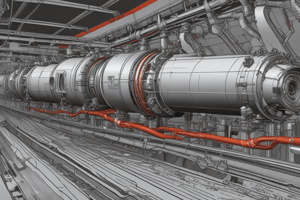Podcast
Questions and Answers
What did early Indian philosophers classify matter into?
What did early Indian philosophers classify matter into?
- Five basic elements (correct)
- Two chemical compositions
- Ten different categories
- Three states of matter
What is the physical property of matter discussed in this chapter?
What is the physical property of matter discussed in this chapter?
- Chemical composition
- Mass (correct)
- Temperature
- Color
What is the main classification of matter mentioned by modern day scientists?
What is the main classification of matter mentioned by modern day scientists?
- Based on temperature and volume
- Based on color and smell
- Based on physical properties and chemical nature (correct)
- Based on shape and size
Which of the following is NOT considered matter according to the text?
Which of the following is NOT considered matter according to the text?
What was the classification of matter proposed by ancient Greek philosophers?
What was the classification of matter proposed by ancient Greek philosophers?
What are the two types of classification of matter mentioned in the text?
What are the two types of classification of matter mentioned in the text?
What do all things mentioned in the text have?
What do all things mentioned in the text have?
What modern scientific concept relates to the ancient classification of 'Panch Tatva'?
What modern scientific concept relates to the ancient classification of 'Panch Tatva'?
What physical change occurs in the activity described in Section 1.1?
What physical change occurs in the activity described in Section 1.1?
What is the fourth state of matter predicted by Albert Einstein?
What is the fourth state of matter predicted by Albert Einstein?
What are the three states of matter that exist around us?
What are the three states of matter that exist around us?
Describe the arrangement of particles in solids, liquids, and gases.
Describe the arrangement of particles in solids, liquids, and gases.
How can the state of matter be changed?
How can the state of matter be changed?
What is sublimation and what is unique about it?
What is sublimation and what is unique about it?
Explain the concept of boiling.
Explain the concept of boiling.
What are the three basic characteristics that differentiate the states of matter?
What are the three basic characteristics that differentiate the states of matter?
What did Eric A. Cornell, Wolfgang Ketterle, and Carl E. Wieman receive the Nobel Prize in Physics for in 2001?
What did Eric A. Cornell, Wolfgang Ketterle, and Carl E. Wieman receive the Nobel Prize in Physics for in 2001?
What are the specific conditions needed to form a Bose-Einstein Condensate (BEC)?
What are the specific conditions needed to form a Bose-Einstein Condensate (BEC)?
How do the forces of attraction between particles vary in solids, liquids, and gases?
How do the forces of attraction between particles vary in solids, liquids, and gases?
Flashcards are hidden until you start studying




